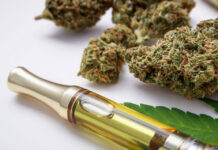
NORML Founder Keith Stroup
For NORML’s 50th anniversary, every Friday we will be posting a blog from NORML’s Founder Keith Stroup as he reflects back on a lifetime as America’s foremost marijuana smoker and legalization advocate. This is the eighth in a series of blogs on the history of NORML and the legalization movement.
One of the more pleasant personal benefits of spending much of my professional life working at NORML has been the opportunity to meet and work with a number of interesting celebrities who were equally motivated to speak out against marijuana prohibition. People such as Woody Harrelson, Bill Maher, Tommy Chong, Rick Steves (who serves on NORML’s Board of Directors), Hunter Thompson and Hugh Hefner. And, of course, the celebrity supporter who is most closely identified with marijuana by the American public, and who has been involved with NORML since the mid-1970s, and who continues today to serve as the co-chair of the NORML Advisory Board, singer/songwriter (and proud marijuana smoker) Willie Nelson.
Willie has a 700-acre ranch which he calls “Luck” in Spicewood, TX, about 30 miles outside of Austin. It includes a private golf course, a recording studio and a concert venue, as well as more than 70 horses that Willie has rescued from the slaughterhouse. He also owns a home in Maui, Hawaii, where he enjoys hiding out for a few days when he has a longer break from touring. But the reality is Willie Nelson effectively lives on his tour bus and he essentially tours year round.
When one is working with Willie on a project, the usual method of moving plans forward is to arrange to meet with him on his tour bus wherever he is playing that night. It is a somewhat unique way to conduct business but his tour bus, named “Honeysuckle Rose”, is Willie’s combination home and office while he is on the road. And that is most of the time.

Keith Stroup and Willie Nelson on the Honeysuckle Rose
I first met Willie Nelson in the mid-1970s. I had managed through a mutual friend who worked at the Washington Post to get myself invited to spend a few minutes with Willie on his bus, following a concert in Washington, DC. I had unsuccessfully tried to get a message through to Willie on a couple of prior occasions, as I knew he was a marijuana smoker and thought if I could meet him he might become a NORML supporter, but my Washington Post connection clearly had more clout. I managed to get on the bus, and we shared a joint I had brought with me, and I had a few minutes to explain to Willie what we were trying to do with NORML. It was a pleasant, if short introductory visit (he had others waiting to get on the bus and share a smoke), but we did not solidify the relationship until later, after Jimmy Carter had been elected president in 1976.
I had by then become friends with Phil Walden, the young, hip head of Capricorn Records out of Georgia, and the manager of the Allman Brothers band, a band that had supported Jimmy Carter for president. Phil was a close friend of then-Governor Carter and the Carter sons, and he had at one point, soon after President Carter had been elected, brought the president’s son Chip over to the NORML office at 23rd and M Street, NW in Washington, DC to meet with me. We talked about the progress we were making on the marijuana front, and after about a half hour, Chip Carter and Phil Walden left to return to the White House.
There were indications that this might really be a different administration, one that would be more open to implementing the 1972 report of the Marijuana Commission that had recommended that America stop treating marijuana smokers as criminals.
Within a few weeks I was invited to join the White House staff on a chartered bus heading out to the upcoming Willie Nelson concert, where I hung out backstage with a number of the Carter White House stars, including Jodie Powell and Hamilton Jordon, as well as my new friend Chip Carter. I introduced myself to those I had not met and settled in to chat with Chip, who wanted to know what we were doing after the concert. I knew we were expecting to go back to the hotel with Willie Nelson and smoke a joint, so I invited Chip and his wife to join us. And they did.
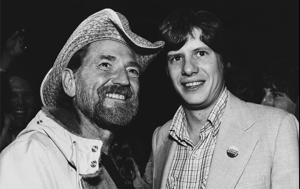
Willie Nelson and Chip Carter in 1980
We all retired to Willie’s room for some pleasant conversation and marijuana smoking, which began a relationship with Willie that has lasted over several decades.
As part of that friendship, for many years I would typically manage to meet up with Willie once or twice each year when he was playing a concert in the Washington, DC region to bring him up to speed on the political progress we were making and to share some good weed. I valued Willie’s support and wanted to reinforce our friendship, and I enjoyed the personal time with Willie. He is a gentle, unassuming man and his open, welcoming style is infectious. It was always a special experience to hang out smoking weed with Willie.
Some may recall the widely-shared story that on one of his visits to the White House during the Carter presidency, Willie managed to smoke a joint on the roof. While I was not there, I have no reason to doubt the truth of that story. I expect that may well have been a first.
Family Farmers and Legalizing Marijuana
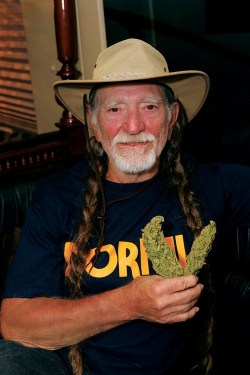
Willie Nelson
Willie Nelson is probably best known politically for his work in support of family farmers, including especially his annual Farm Aid benefit concerts which have raised tens of millions of dollars to help family farmers striving to hold on to their farm and country lifestyle. Farming is a risky business in the best of times, and a stretch of bad weather or the occurrence of floods, hurricanes and other natural disasters can easily force a family farmer into bankruptcy or force them to sell their farm to corporate agriculture. Each year the number of family farms goes down.
This appreciation of the family farmer is obviously something that goes back to Willie’s experience growing up in Abbott, Texas, and the farmers of America return that love to Willie. A few years ago, when the federal government determined that a tax shelter Willie (and many others) had invested in, on the advice of his tax advisers, was illegitimate, they claimed he owed the government several million dollars in back taxes. When they attempted to execute that judgment by selling at auction his recording studio, including a lifetime of personal items and awards, and his farm outside of Austin, TX, the farmers from the American Agricultural Movement (AAM) went to the sale en mass and bid a modest price, and spread the word that others should stay out of the bidding. Once they had bought the property at auction, they turned around and gave it back to Willie, as a demonstration of their appreciation for all the work Willie had done for family farmers over the years.
The other focus of Willie’s political attention has been the legalization of marijuana. Willie and I have frequently talked over the years about the natural crossover between those two issues. The current loosening of the state and federal prohibitions against growing industrial hemp (defined as having less than .03 percent THC) may in fact provide a financial lifeline to a lot of remaining family farmers.
Sharing a joint or two of my best marijuana – usually from Humboldt County — with Willie became part of a ritual that Willie and I followed without fail whenever we had the opportunity to hang out. We always kid each other about who has the finest quality marijuana (Willie usually does), and pretend the other’s stash is somehow inferior.
“What is this ditchweed, Keith?” Willie would sometimes tease as he tried some of my grass.
“Be careful with that,” I would retort, “It’s liable to knock you on your ass.”
Of course, both of us always had good weed, so there was no loser in this game.
“America’s most beloved marijuana smoker.” That’s what I tell Willie he is, but then I remind him that he is also America’s only beloved marijuana smoker, and we laugh and pass the joint. Willie is an icon who is loved by tens of millions of Americans for his country music and his charming country style, despite the fact that for more than 40 years, he has been open and honest about the enjoyment he derives from smoking marijuana. Willie is totally comfortable with himself, and that includes his marijuana smoking. He is a proud smoker and he seldom does an interview with anyone without making the point that he is a marijuana smoker and that smoking should be legalized for adults.
Sometimes Different Rules Apply to Willie
As lots of celebrities can attest, high-profile marijuana smokers can sometimes be easy targets for law enforcement. And Willie has had a number of encounters with law enforcement over the years. Spending so much time on the road, where anyone is more vulnerable to a warrantless search, and much of it in rural America, where attitudes towards marijuana smoking have been slow to change, it is amazing that Willie has survived with only minimal disruption to his lifestyle.
But Willie is held in a special place in the hearts of millions of Americans, including many in law-enforcement. This fact that was clearly demonstrated on two occasions in recent years when he had been busted for his use of marijuana. The first occurred several years ago when Willie was returning from a late-night poker game with friends in Austin, TX. Feeling sleepy, he wisely pulled off the road at a rest stop, locked his car doors and took a nap. Unfortunately, he had left a fat joint clearly sitting in the ashtray of his little Mercedes coup, and a local cop came along, saw the car and decided he should check to see if everything was all right. When he shined his flashlight into the car and saw the hand-rolled cigarette in the ashtray, he awakened Willie, placed him under arrest, and took him to the local police station.
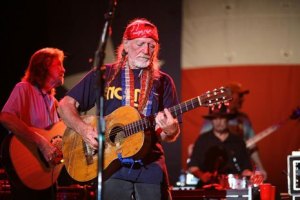
Willie Nelson plays at 2007 Freedom Fest NORML benefit concert
The other police were so irritated at the cop for making the silly bust on their favorite country singer and local resident that one of the police stepped up and made bond for Willie, so he would not have to spend the night in jail. Later, when the case came to court, Willie’s lawyers argued successfully that the evidence should be suppressed, since thousands of Texans still hand-roll tobacco cigarettes, and therefore there was no probable cause for the police to have arrested Willie in the first place. The charges were dropped. Again, I doubt that would have been the outcome for any other individual under similar circumstances, but Willie is seen as “one of them” and they tend to protect him.
On another occasion in 2006, Willie’s bus was stopped at an agricultural checkpoint in Louisiana while driving from one concert to another. All trucks and busses were being routinely stopped to make certain they weren’t carrying any banned agricultural products; it wasn’t specific to Willie, nor did it have anything to do with how the bus was being driven.
The state cop boarded the bus to do an inspection of it; he later said he almost passed out from the thick marijuana smoke. Upon searching the bus, he found approximately one pound of marijuana, as well as an ounce of magic mushrooms. There were five or six people on the bus at the time, friends of Willie’s who were just hanging out, as well as Dave Anderson, Willie’s personal assistant who traveled with him every day. It was through David that I generally scheduled my periodic visits with Willie on the bus.
In the regular world, unless someone came forward to claim the drugs, everyone on the bus would be charged with at least two felonies (possession with the intent to distribute marijuana and mushrooms), all would be arrested, and bail would likely be set at $10,000 or more for each of them. “We’ll just let the court sort it out,” is a common refrain from the police when they have several possible defendants and no one is stepping forward to claim ownership of the drugs.
In the world of Willie Nelson, everyone on the bus claimed they had bought the marijuana together, and that one fifth of the total belonged to each of them. Based on that theory, the state police charged each of them with a misdemeanor for possession of marijuana for personal use, and gave them a citation, avoiding an arrest altogether. (Dave Anderson claimed ownership of the mushrooms that he said someone had given him at the last stop, and he claimed ignorance of what they were.) Because the police were concerned that the driver of the bus might be impaired just from the second-hand smoke (Willie’s drivers never smoke), they did hold the bus alongside the road for a couple of hours while Willie arranged to have another driver come to drive the bus. All passengers ended up paying a few hundred-dollar fine, and the case was closed.
That is evidence of the special regard average Americans, cops in this instance, feel for Willie, despite his marijuana use. Because he is considered one of them, a Texas-based regular guy, they protect Willie from the consequences other marijuana smokers might face.
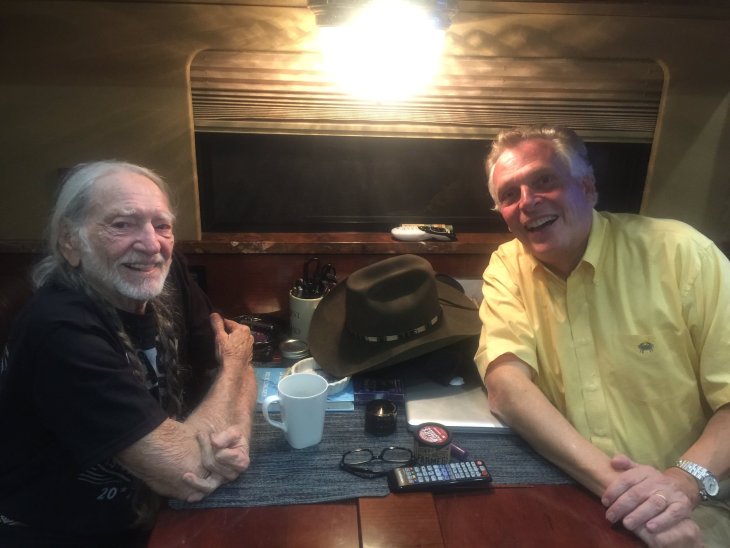
Willie Nelson and Virginia Governor Terry McAuliffe on the Honeysuckle Rose
On one occasion in 2006, I flew out to Maui to spend some private time with Willie and a couple of mutual friends who also live on the island. I was only there for three or four days, but each afternoon or evening we would drop by Willie’s house for one of his frequent poker games with his buddies, including his neighbor and good friend Woody Harrelson (also a member of the NORML Advisory Board).
Willie is a serious poker player and loves to win, which he often does. The game is not a particularly high-stakes game, at least for celebrities who can afford a game with a $100 betting limit (with a maximum of three raises, that means one could easily win or lose several hundred dollars on each hand), but it was out of my affordable range, so I smoked and hung out with the group, but did not play. There were always four or five players and a couple of us hangers-on, and the friendly competitive spirit assured an entertaining banter reflecting the comradery they had clearly developed.
It was nice to see Willie when he was totally relaxed and off the road. Instead of Willie Nelson the international celebrity, with gaggles of fans trying desperately to say hello or shake his hand, it was Willie the local boy just hanging out with good friends, who were more than willing to give him a hard time about his poker playing, his age, his political views, any recent troubles he might have had on the road, or anything else that good friends like to kid each other about. And Willie obviously enjoyed being treated like just an ordinary friend, instead of a celebrity, for a change. But one thing remained the same: the joints just kept coming, and no one was complaining about that. I felt fortunate to spend some time with Willie in that personal environment.
Willie on the Hill
During the period of time when I had left NORML for a few years, following the incident involving Dr. Peter Bourne, President Jimmy Carter’s drug advisor (the subject of a subsequent blog post), I ended up calling Willie to ask if he was aware of any opportunities for me to work on Capitol Hill on the family farm issue, something that he and I had often discussed. To my delight, Willie contacted some of his allies who were working on behalf of family farmers (i.e., then MN Secretary of Agriculture Jim Nichols, a progressive leader in the family farm movement; and David Senter, the head of the American Agriculture Movement). AAM is the family farm advocacy group that had a few years earlier shut down the entire District of Columbia for a couple of days by bringing a “tractorcade” comprised of scores of farm tractors to clog the major streets and the capital beltway, to make their point that Congress should reorient their farm policies to make them less supportive of corporate agriculture and more friendly to family farmers.
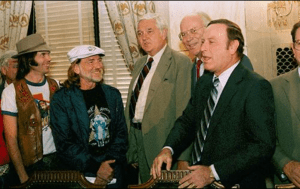
Neil Young and Willie Nelson meeting with members of the Senate Agriculture Committee
As a result of Willie’s support, I ended up with consulting contracts with three different family farm organizations. First, and most importantly, the American Agriculture Movement hired me as a lobbyist and gave me an office in their Capitol Hill headquarters. I thoroughly enjoyed the time I spent representing family farmers on the Hill. I felt a natural kinship with the farmers whose welfare we were working to protect. After all, I too was raised on a family farm. And it was the flip side of representing marijuana smokers; this time the elected officials loved my clients, so I started off with an advantage.
The highlight of those years was when I convinced Willie to come to DC for the day and let me take him to meet with a bunch of US senators to discuss the urgent need for a farm bill that would make it possible for more families to stay on their farms.
When I began calling the offices of some key farm state senators to ask if I could bring Willie Nelson by for a meeting, the response was overwhelming. They were delighted to find time to meet and have their photo taken with Willie, and as word began to spread, I began getting calls from some offices asking if Willie could come by to meet their boss.
When the day arrived for Willie to do his lobbying, he, AAM’s David Senter and I began with individual meetings in the morning, then held a group luncheon for several senators, and resumed to additional individual meetings in the afternoon. Each stop was the same. We introduced Willie to the senators, some of whom he had met through his Farm Aid work, and Willie would lay out the key provisions we thought were most important to include in the next farm bill, a legislative package that covered five years at a time. Then Senter and I provided any details they wanted and handled any follow-up.
As word spread that Willie Nelson was in the senate office buildings, crowds of staffers began to form in front of each office in which we were meeting. They wanted to say hello, and shake Willie’s hand. This scene would then repeat itself at the next office. I had spent many days on the Hill, but I was generally handed off to the staff member who handled agricultural matters, and I rarely saw the senator personally. Now we weren’t only meeting with every senator in sight—they were clamoring for Willie’s autograph and photo for their office walls. It was fascinating to see the advantage you have with a celebrity bringing your message to Congress.
When we had only one or two meetings left for the day, Willie said, “Hey, Keith. I think it’s about time for us to go smoke a number. What do you say we go back to my hotel and fire one up?”
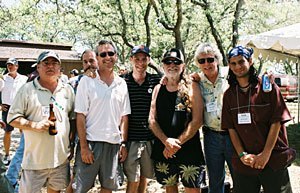
Steve Lach, Dan Viets, Allen St. Pierre, Kris Krane, Willie Nelson, Keith Stroup, and Paul Armentano at 2005 NORML Golf Benefit
“That’s your call,” I said. “You’ve done a good day’s work and we can bring this to a close whenever you want.”
With that, we grabbed a cab, went back to Willie’s hotel, and I called and cancelled the final two meetings we had scheduled, making some feeble excuse to the disappointed staffers. Then we sat around for a couple of hours discussing the various meetings we had held, making notes, and we smoked some of Willie’s good weed. Senter, who is about my age and is an old Texas farmer himself, had never smoked marijuana, but he enjoyed drinking a few beers and hanging out with us two old potheads.
That was the highlight of my many years working on and around Capitol Hill, and the memory of that day ranks very high in my personal bank of favorite experiences.
Over the years, Willie has continued to play a prominent role and starting in 1994, he accepted the position of co-chair of our NORML Advisory Board, a position he still holds today. He has held a NORML benefit golf tournament at his private golf course outside of Austin, TX, and a NORML benefit concert in Austin. He is a proud marijuana smoker who stopped using alcohol decades ago, and he credits his longevity to that decision. There is no celebrity in America who has done more to support NORML and to advance the legalization of marijuana than Willie, and he remains the most famous marijuana smoker in America even today at age eighty-seven. One of his recent songs was titled “Roll Me Up and Smoke Me When I Die”! His impact on NORML and the drive to legalize marijuana has been unique, and significant. Willie is a living billboard for marijuana smoking!
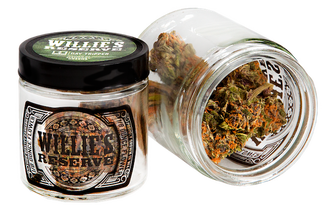
Willie’s Reserve
And as it should be if one believes in karma, in 2015 Willie Nelson began marketing his own brand of marijuana, called Willie’s Reserve, in the states that have legalized the adult use of marijuana. And as you would expect, all of his marijuana is grown by independent family farmers.


